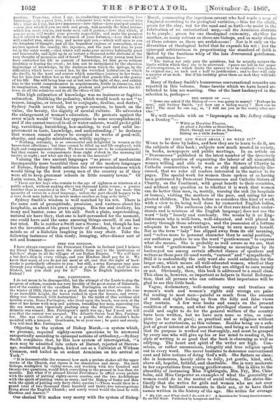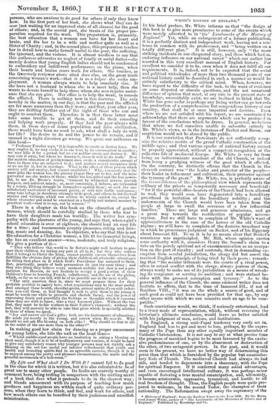MY LIFE AND WHAT EMAIL 1 DO WITH IT F.*
WORK to be done by ladies, and how they are to learn to do it, are the subjects of this book ; subjects now much mooted in society, in books, newspapers and public meetings. In an article on "Deaconesses" published in the latest number of the Quarterly Reriew, the question of organizing the labour of all unmarried women willing and able to work as the Sisters 'of Charity in Catholic communities work, was so ably and satisfactorily dis- cussed, that we refer all readers interested in the matter to its pages. The special work for women there spoken of as having been performed by Protestant Deaconesses and Catholic Sisters of Charity, on the Continent, with great benefit to their countries, and without any question as to whether it is work that women can do better than men, is, mainly, nursing the sick (inhospitals or homes), visiting the mothers of the poor, and caring for ne- glected children. The book before us considers this kind of work with a view to its being well done by unmarried English ladies, young or old. The authoress (she is of that rare kind that under- stands and is mistress of the English language) does not use the word " lady " loosely and carelessly. She means by it an Enq- lishwoman who is well-born, well-educated, and well placed in society through those advantages, and the -possession of.a fortune adequate to her wants without having to earn money herself. But as the term " lady " has slipped away from its old meaning, and "refers more to " personal character than to social position,' our authoress prefers to use the word " gentlewoman" to express what she means. She is probably as well aware as we are, that this word " gentlewoman " is becoming as meaningless by its hackneyed use among certain affected classes of speakers and writers as those poor ill-used words, "earnest" and" sympathetic." Still it is undoubtedly the only word she could substitute for the larger one which means all well-educated women' whether they are well-horn or not, and whether they are obliged to earn money or not. Obviously, then, this book is addressed to a small class. This class is, however, so important as helpers in Social Reforma- tion that all persons who can estimate that importance will be glad to see this little book.
Vague, declamatory, well-meaning essays and treatises on women's work and women's rights and wrongs are pain- ful reading to most men—painful as much from the amount of truth and right feeling as from the folly and false views they contain. A few wise books and essays on the present condition of women, and what the privileged classes of women could and ought to do for the general welfare of the country have been written, but we have seen none so wise, so com- plete (as far as it goes); so practical and so religious without bigotry or sectarianism, as this volume. Besides being on a sub- ject of great interest at the present time, and being so well treated that its purpose is worked out thoroughly, and must be grasped by every one who will give up his or her mind to reading it, the style of writing is so' good that the hook is charming as well as edifying. The heart and spirit of the writer are high. Con- scious, or rather unconscious, integrity and true religion speak out in every word. She never hesitates to denounce conventional cant and false notions of doing God's will. She flatters no class ; she is humorous, keenly alive to folly, yet gentle, kind, and, above all, hopeful, faithful, and charitable. She is very moderate in her expectations from young gentlewomen. Sim is alive to the absurdity of instancing Miss Nightingale, Mrs..Eiy, Mrs. Chis- holm, and Miss Carpenter as examples of what the generality of women could do in the matter of social reform. She states dis- tinctly that she writes for girls and women who are not ever likely to be brilliant ornaments to their sex, Or to have their names written in the history of the age. She writes for average
• Hy Life and What shall I Da with It 1 A Question for Young Gentlewomen. By an Old Maid. Published by Longman and Co.
persons, who are anxious to do good for others if only they knew how. In the first part of her book, she shows what they can do
now (not waiting for an improved state of all classes) for the good
of others; and, in the second part, she treats.of the proper pre- paration required for the work. This preparation is, primarily, the best education that a woman can have for. her heart and brain, and fits her to be a wife and mother quite as well as a Sister of Charity ; and, in the second place, this preparation teaches her in detail how to make herself useful to the poor, the suffering, the ignorant, and the vicious. 'It is almost needless to say that this authoress advocates no neglect of family or social duties—she merely desires that young English ladies should not be condemned to embroidery and indifferent performance on the piano, when their hearts and brains crave work for others. She touches, as
the Qkarterly reviewer above cited does also, on the great truth concerning woman's work—that it is as a helper she seeks em- ployment. A woman always wants to help somebody else. If
she have not a husband to whom she is a meet help, then she wants to devote herself to help those whom she sees require assist- ance that she can give. Her office is to help the weak, to console the afflicted. There is nothing new in this doctrine. The only novelty in the matter, in our day, is that the poor and the afflicted are far more numerous than they were ; and that, year after year, they are drifting further out of the sight of those who can and ought to comfort them. Therefore it is that these latter must take some trouble to get at them, and do their consoling and helping work properly. If they had the poor always with them, in these days of dense population and false civilization, there would have been no need to ask, what shall a lady do with her life ? The desire to do and the power to do remain, and if unused in a right direction go wrong. We quote our authoress on this head-
" Professor Faraday says, it is impossible to create or destroy force. We may employ it, we may evoke it in one form by its consumption in another;
we may hide it for a period, but we can neither create nor destroy it. We may cast it away, but where we dismiss it, there it will do its work.' Now the modern education of gentlewomen does evoke a considerable amount of force in those who are subjected to it ; and modern society recognizes little
or no use for it, but in marriage. What is the effect of these powers which society will not employ, but mina annihilate ? Why, commonly that the more gifts the woman has, the greater plague they are to her, and the more
perverted use she makes of them; whilst the less gifted and the less power- ful, to use Dr. Moore's words, 'torment by whimsical nerves, peevish tempers, and indolent minds; or, more commonly, I believe, are tormented
by a weary, lifelong struggle in themselves against these ; or seek the un- satisfactory excitement of incessant gaiety, or sink into feeble uselessness ; some take refuge in desultory attempts to do good, and others in intellectual studies and writings, whieb can seldom he wisely carried on, except the whole character and mind be exercised in a healthy and natural manner by practical work—that is to say, not by women.' "
. There is a chapter in this book on the education of gentle- women, which should be carefully studied by those who fear to have their daughters made too worldly. The writer has sym- pathy with the pleasures of the young, and says that, when a girl's school education is over at eighteen, she should lead an easy life for a time ; and recommends country pleasures, riding and driv- ing, music and dancing, &c. To objectors, who say that this is not the education for a Christian woman, a life fit for immortal beings, she has an excellent answer—wise, moderate, and truly religious. We give a portion of it-
" They who believe this world to be Satan's might well hesitate to pre- pare their children for taking any part at all in it ; but they who confess that it belongs to Christ the King, cannot possibly excuse themselves from fulfilling the obvious duty of giving their children all attainable advantages for filling that place in it which God's Providence has assigned to them. But, practically, people of both persuasions do just the seine thing ; and they who think they believe every moment sinfully lost that is not a pre- paration for Heaven, do not hesitate to occupy a good portion of their children's time in learning French, calisthenics, and the use of the globes, which, so far as we can tell, will be of no possible use in the next world. "The only question then is, since we must prepare them for their probable position in society here, what acquisitions may be the most useful. And amongst these health, cheerful spirits, animal spirits if you will (what- ever you call them, as God thought it well to give them to the young it must be worth our while to preserve and cherish them), and the power of expressing freely and gracefully the feelings or thoughts which it concerns those they am with to. know, take a very foremost place. Without the two first, they must be feeble workers in their Father's vineyard ; without the last, they will acarcely, be able to take that place which is specially allotted to those of whom we speak.
"Joy and sorrow are God's gifts; both are his instruments of education ; He sends joy mostly to the young, and sorrow when He sees fit. Why should we not ask His blessing on both alike ? Why should we fear to die in the midst of the one more than in the other ?"
In making good her claim for dancing as a proper amusement for young ladies, she hits the nail on the head tints-
" Whilst middle-aged people have no hesitation in asking a blessing on their meal, though it is to be of mulligatawny and venison, it would be hard to give any satisfactory reason why younger persons may not rightly ask a blessing on the not less useful nor inferior refreshment that youth and health and bounding spirits find in an agreeable exercise, though it is to be enjoyed among the pretty and pleasant circumstances, the music and the graceful movements of a ball-room."
My Life and What shall I Do With It cannot fail to do good in the class for which it is written, but it is also calculated to be of great use to many other people. Its faults are scarcely worthy of comment here, being trifling in comparison with the sterling merit of a book that does what it pretends to do in the clearest way ; and blends amusement with its purpose of teaching how much goodness and happiness are within reach of quite ordinary per- sons, when they learn to think, and feel, and work for others, and how much others can be benefited by their judicious and unselfish ministration.



























 Previous page
Previous page